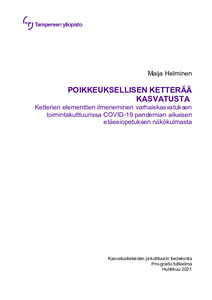Poikkeuksellisen ketterää kasvatusta : Ketterien elementtien ilmeneminen varhaiskasvatuksen toimintakulttuurissa COVID-19 pandemian aikaisen etäesiopetuksen näkökulmasta
Helminen, Maija (2021)
Helminen, Maija
2021
Kasvatuksen ja yhteiskunnan tutkimuksen maisteriohjelma, varhaiskasvatus - Master´s Programme in Educational Studies, Early Childhood Education
Kasvatustieteiden ja kulttuurin tiedekunta - Faculty of Education and Culture
This publication is copyrighted. You may download, display and print it for Your own personal use. Commercial use is prohibited.
Hyväksymispäivämäärä
2021-05-12
Julkaisun pysyvä osoite on
https://urn.fi/URN:NBN:fi:tuni-202104243447
https://urn.fi/URN:NBN:fi:tuni-202104243447
Tiivistelmä
The coronavirus pandemic tested the agility of both individuals and organizations alike. Nowhere were the effects quite as tangible as in the early education system, which suddenly had to enable children to attend preschool from their homes as a part of the remote work recommendation given by the government struggling to flatten the curve. This unprecedented challenge tested the true agility of the early education services of the city of Tampere. A field that is usually derived of due praise and acknowledgement has through the years given subtle hints of the agile potential that lies under its conservative surface. However never before has agile organization methodology and early education been connected through research in the scientific community nor addressed in the public discourse.
This study aims to determine how the elements of agile appeared in the operational culture of early education’s remote preschool period during the coronavirus pandemic. These elements consist the most crucial traits and visions of Denning’s (2018) agile laws; the Law of Customer, the Law of Small Teams and the Law of Networking. By investigating how the values of the agile organization and leadership methodology manifested in the experiences of the early education teachers and special education teachers who were a part of developing and implementing the remote preschool operation the study is able to indicate those operational culture values of early education which both further and hinder the actualization of these agile elements.
To test the hypothesis fromed first through an operational culture comparison suggesting that early education’s operational culture infact has innate agile elements and values, seven early education teachers and special needs early education teachers were interviewed concerning their experiences while working as a part of the remote preschool. The interviews wereconducted using a theme-interview method and a visualization excersize. The material was analyzed using a qualitative research content analysis quided by the Agile Law theory of Stephen Denning (2018). The results showed remarkable agile vision within the early education’s operational culture in terms of creating individual pedagogical value to each child, which correlates with the agile elements which the Law of the Customer consists of. In addition, the relative autonomy enjoyed by the teachers and services of Finnish educational system had a positive effect on the percieved agility of the remote prechool of the early education of the city of Tampere. However poor communication due to steep hierarchy within the organization hindered the actualization of the other agile elements in this context.
These results suggest that there is much need for a broader discussion and development in terms of agility within early education services. By developing the implementation of agile vision through pedagogical leadership and enabling inclusive communication and networking by tearing down the organizational hierarchy we can ensure the agility and future-oriented culture of early education now and in the unpredictable world of tomorrow.
This study aims to determine how the elements of agile appeared in the operational culture of early education’s remote preschool period during the coronavirus pandemic. These elements consist the most crucial traits and visions of Denning’s (2018) agile laws; the Law of Customer, the Law of Small Teams and the Law of Networking. By investigating how the values of the agile organization and leadership methodology manifested in the experiences of the early education teachers and special education teachers who were a part of developing and implementing the remote preschool operation the study is able to indicate those operational culture values of early education which both further and hinder the actualization of these agile elements.
To test the hypothesis fromed first through an operational culture comparison suggesting that early education’s operational culture infact has innate agile elements and values, seven early education teachers and special needs early education teachers were interviewed concerning their experiences while working as a part of the remote preschool. The interviews wereconducted using a theme-interview method and a visualization excersize. The material was analyzed using a qualitative research content analysis quided by the Agile Law theory of Stephen Denning (2018). The results showed remarkable agile vision within the early education’s operational culture in terms of creating individual pedagogical value to each child, which correlates with the agile elements which the Law of the Customer consists of. In addition, the relative autonomy enjoyed by the teachers and services of Finnish educational system had a positive effect on the percieved agility of the remote prechool of the early education of the city of Tampere. However poor communication due to steep hierarchy within the organization hindered the actualization of the other agile elements in this context.
These results suggest that there is much need for a broader discussion and development in terms of agility within early education services. By developing the implementation of agile vision through pedagogical leadership and enabling inclusive communication and networking by tearing down the organizational hierarchy we can ensure the agility and future-oriented culture of early education now and in the unpredictable world of tomorrow.
